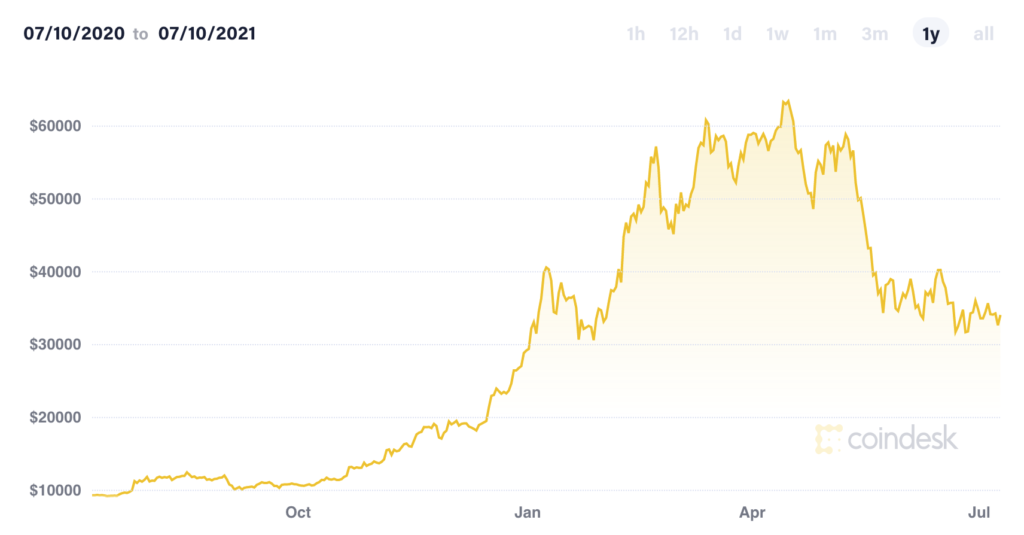You’ve likely been aware of how much hype there is surrounding Bitcoin these days. You may be hearing stories about a neighbor’s friend making a fortune trading the cryptocurrency. And that might leave you wondering if you are missing the boat. Should you jump into Bitcoin or other cryptocurrencies?
In case you aren’t yet familiar with Bitcoin and cryptocurrency – they are digital currencies (money) that are built on technology called “blockchain” which offers an especially high degree of security and anonymity. They are also “decentralized” which means they are not regulated by a central bank or government. They are essentially a global, digital, secure, and unregulated form of money. Bitcoin is the largest and best-known digital currency, but there are thousands of them.
We are getting an increasing number of questions about Bitcoin as an investment and whether we recommend it.
Here are three things we generally look for in an investment and how Bitcoin stacks up on those measures:
- We seek positive expected return. That’s fundamentally why you invest money – to earn a return. When you buy a stock, you are essentially paying a discounted price for a future cash flow stream from the company. When you buy bonds, you expect to be paid interest and then have your original investment returned to you. In each case, you expect a positive return while accepting the risk that the amount of return may be higher or lower than expected.
Does Bitcoin have a positive expected return? Much like holding cash – no. When you buy Bitcoin, you will need someone to buy it back from you at a higher value in the future to earn a positive return. That may or may not happen. Bitcoin doesn’t produce cash flows or pay interest – it’s just a store of value. Whether it increases in value over time will depend on many factors like supply and demand, competing currencies, or how widely it gets adopted as a preferred digital currency.
Thus – it might increase in value (and already has tremendously since its inception), but there’s not an obvious underlying reason why it should in the future. It’s notoriously difficult to predict and time currency price movements and Bitcoin is no exception.
2. A second quality we may seek in an investment is that it lowers portfolio volatility. Bonds are the most common example of an investment used to meet this goal. Bonds generally have positive expected return and are usually lower risk than stocks. Including them in a portfolio can smooth out the volatility and thus reduce uncertainty.
Bitcoin has been an incredibly volatile asset. It has had three 80% drops since 20121 and can gain or lose 40% within a couple of months. As you can see from the chart of Bitcoin’s price over the last year, it’s down 47% from its high this year. That volatility is thrilling when it’s a gain but can be devasting when it’s a loss. Thus, adding Bitcoin to a portfolio may not do a good job of reducing volatility.
3. A third quality we look for in an investment is liquidity – its ability to help us meet our upcoming, short-term cash needs. Bitcoin does easily convert into the dollars we plan to spend, but the extreme volatility in short time periods leaves the huge risk that the funds you need will have taken a big hit and compromised your plans. Thus, Bitcoin isn’t a great tool for liquidity.
Some other Bitcoin considerations include:
Security:
Bitcoin exists only as computer code and is held in digital wallet form and requires passwords to access. Should you forget or lose those passwords, there is no central authority which can provide them to you. You risk losing the currency for lack of being able to access it. It’s estimated that as much as 20% of Bitcoin may be inaccessible to its owners.2 There’s even the story of the person who lost the password to $200 million worth of Bitcoin and only has two password attempts left before he is permanently locked out. There’s the man whose hard drive which holds the password to $280 million in Bitcoin is in a UK dump and he is trying to get permission to scour the dump for it.3
Also, the complexity of holding the digital money has led to some high-profile thefts of the asset, most notably the apparent absconding with as much as $3.6 billion in client Bitcoin by the founders of South Africa’s largest cryptocurrency exchange (details are still unclear).4
Energy:
Bitcoin is much maligned for the energy usage required to “mine” for it. Bitcoin is created by running enormous amounts of computers working to solve complex math problems. If Bitcoin were a nation, it would rank in the top 30 in the world for energy usage.5 Granted, plenty of that is renewable energy and other cryptocurrencies are created without this same energy demand. But many object to Bitcoin’s energy demands.
Appropriateness:
The UK Financial Conduct Authority prohibited the sale of “cryptoasset” investments to retail investors last year. Reasons they sited include: no reliable basis for valuation, market abuse and financial crimes in cryptoasset trading, extreme price volatility, inadequate understanding of cryptoasset by retail investors and the lack of clear investment need for them.6
Summing Up
We don’t recommend investing in Bitcoin or any other cryptocurrency because we don’t see positive expected return, how it lowers portfolio volatility or that it is a helpful form of liquidity.
That said, we fully expect our future to be one in which we all use cryptocurrency. And we believe the blockchain technology on which it’s based will be effectively applied across many industries. Thus, our abstaining from investing in it is not a lack of belief in the viability and effectiveness of the technology or the currencies. They are great tools. It’s just that they don’t meet our investment criteria. They meet the definition of a speculative gamble more than that of a sound investment.
Cryptocurrencies will continue to create millionaires. And will bankrupt others. Time will tell which crypto comes to dominate our transactions and ends up delivering great returns and it might seem obvious in retrospect. But from where we stand today, it’s a risky wild west in crypto-land and we urge caution. We’re always OK with a bit of “specutainment”, but only in a way that won’t harm you.
In addition to the more common ways to own cryptocurrency via an exchange like Coinbase or Gemini, PayPal and Venmo are making it as easy as a touch of a button to participate in and use Bitcoin, Ethereum and other popular digital currencies.
Feel free to call if you’d like to discuss more about cryptocurrencies.
Another Excellent Quarter
Meanwhile, as you’ll see from this review, it’s been yet another excellent quarter (and year-to-date) for portfolios with healthy positive returns across all the major asset classes. We are delighted with this continued prosperity, especially considering the global challenges the last year+ delivered.



